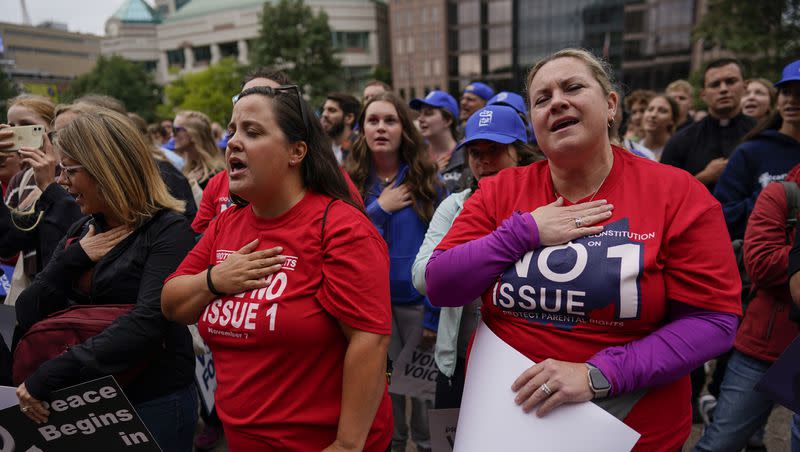Ohio voters pass constitutional amendment guaranteeing access to abortion

- Oops!Something went wrong.Please try again later.
- Oops!Something went wrong.Please try again later.
Ohio voters approved a state constitutional amendment Tuesday, guaranteeing access to abortions in the state up to 22 weeks of pregnancy. Ohio voters also legalized recreational marijuana for adults in the state.
As of late Tuesday, the split was 56% in favor of the abortion ballot measure and 44% opposed, in what was just one of several elections to watch across the country on Election Day.
Earlier on Tuesday, before results were in, KSL News Radio’s Boyd Matheson, host of “Inside Sources,” said results Tuesday would show what voters are thinking in the lead-up to 2024.
“The vast majority of the country,” Matheson said, “is in the movable, the center-left to center-right, and they are getting exhausted by the extreme left and the extreme right” when it comes to abortion legislation.
Besides Ohio, the nation’s eyes were on gubernatorial races in Kentucky and Mississippi, a state Supreme Court race in Pennsylvania, and legislative races in Virginia, where Gov. Glenn Youngkin hoped to flip the state Senate, but ended up losing both the Senate and the formerly Republican-led House to the Democrats.
In terms of the mood of the country, Virginia has “become a bellwether,” said Matheson. Of Youngkin’s strategy while campaigning for governor last year, he noted that the hyperfocus was local issues. This helped Youngkin defeat Terry McAuliffe, the incumbent who had support from “the Obamas and a lot of the big, Democratic national machinery,” Matheson added.
But this year, Youngkin wasn’t able to convince Virginia voters to trust him and his fellow Republicans on issues like abortion.
Ohio ballot measure on abortion
Voters in the Buckeye State weighed in on a ballot measure related to abortion. The measure, known as Issue 1, amends Ohio’s Constitution to include the right to an abortion, and includes legal protections for physicians and patients, according to language on the ballot.
The amendment allows for banning abortion after viability, except in situations when the physician deems the procedure necessary to save a pregnant woman’s life or health at any stage of pregnancy.
Ohio has recently been a reliably red state, and lawmakers there had tried to ban abortion after six weeks, with exceptions for the life of the mother but not incest or rape, but the attempt was blocked by a county court.
Measures like Issue 1 tanked in red states like Kentucky, Montana and Kansas, while blue states like California, Michigan and Vermont successfully passed state constitutional amendments.
Ohio voters also approved a ballot measure legalizing recreational marijuana for adults 21 and older, the 24th state to do so, but that measure is subject to legislative scrutiny, so access could change, according to The Associated Press.
Related
Kentucky governor’s race
Incumbent Gov. Andy Beshear, a Democrat, narrowly defeated Attorney General Daniel Cameron, a Republican, by a vote of 52% to 48% as of late Tuesday, according to CNN.
Abortion was also a central issue in this election. Kentucky’s law completely bans the procedure, which has become a focus for abortion rights activists.
At a debate in October, Beshear said his challenger’s “position gives a rapist more rights than their victim. It is wrong. We need to change this law. We need to make sure that those individuals have that option,” as the Courier-Journal reported.
Meanwhile, Cameron said that he is a “pro-life candidate,” while Beshear is an “abortion candidate.” He promised that if the Kentucky Legislature were to pass a bill to include exceptions in the abortion law, he would “certainly sign it.”
Mississippi governor’s race
Late Tuesday, Gov. Tate Reeves, the Republican incumbent, appeared to cinch his race against Brandon Presley, a Democrat, in a state that hasn’t elected a Democratic governor since 1999.
Presley entered the race with some name recognition: He has not only served as mayor of a small town but is the second cousin of iconic signer Elvis Presley, a fact that has helped him raise more than Reeves during the campaign.
Matheson said that the association with Presley might buy the Democratic candidate “an extra few percentage points, but I don’t think it quite gets him across the finish line in Mississippi.”
Virginia Legislature
Republicans had held the state House, while Democrats controlled the Senate, but late Tuesday it looked like Democrats would control both chambers coming out of the election.
Youngkin, seen as a more moderate Republican, had promised a 15-week abortion ban if Republicans controlled the Legislature, according to CNN.
A win for Republicans was seen as a way to help position Youngkin for a potential presidential campaign, which he was interested in, Thomas Peterffy, founder of Interactive Brokers, told Forbes. Youngkin would have had “a platform on which we could say, ‘Look, I turned an all-blue state red, and I can do that nationwide. So please vote for me.’”
Pennsylvania Supreme Court
The open seat on the Pennsylvania Supreme Court was won by Democrat Dan McCaffery, according to The New York Times, in the costliest race ever for the high court in the state. The seat was previously held by the late Justice Max Baer, a Democrat. Since his death, the Democratic majority has been 4-2, which means control of the court will remain unchanged.
This voting cycle will lay the groundwork for 2025, when three Democratic justices are up for reelection after a 10-year term, according to Ballotpedia. Previously, in 2021, Kevin Brobson, a Republican, defeated Maria McLaughlin, a Democrat, in a close election, 52% to 48%.
McCaffery defeated Republican Carolyn Carluccio in a race that cost upward of $22 million.
As CBS News reported, the biggest donors included conservative billionaire Jeffrey Yass, who has shown support for “school choice and anti-regulation causes,” and on the left, trial lawyers and public employee unions funded McCaffery.

